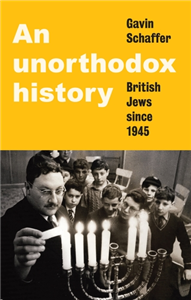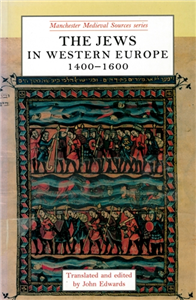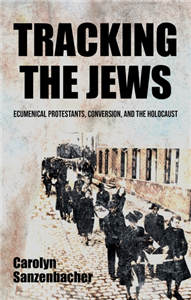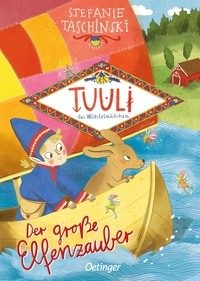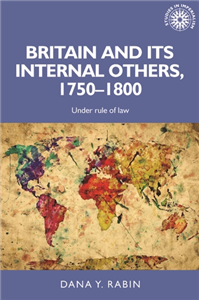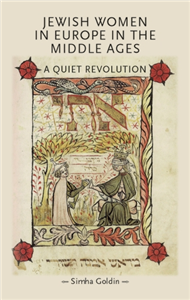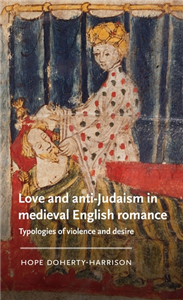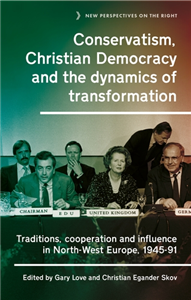Your Search Results
-
Promoted ContentHumanities & Social SciencesJanuary 2013
The Jews in western Europe, 1400–1600
by John Edwards
As European politics, society, economy and religion underwent epoch-making changes between 1400 and 1600, the treatment of Europe's Jews by the non-Jewish majority was, then as in later periods, a symptom of social problems and tensions in the Continent as a whole. Through a broad-ranging collection of documents, John Edwards sets out to present a vivid picture of the Jewish presence in European life during this vital and turbulent period. Subjects covered include the Jews' own economic presence and culture, social relations between Jews and Christians, the policies and actions of Christian authorities in Church and State. He also draws upon original source material to convey ordinary people's prejudices about Jews, including myths about Jewish 'devilishness', money-grabbing, and 'ritual murder' of Christian children. Full introductory and explanatory material makes accessible the historical context of the subject and highlights the insights offered by the documents as well as the pitfalls to be avoided in this area of historical enquiry. This volume aims to provide a coherent working collection of texts for lecturers, teachers and students who wish to understand the experience of Jewish Europeans in this period.
-
Promoted ContentHumanities & Social SciencesFebruary 2025
An unorthodox history
British Jews since 1945
by Gavin Schaffer
A bold, new history of British Jewish life since the Second World War. Historian Gavin Schaffer wrestles Jewish history away from the question of what others have thought about Jews, focusing instead on the experiences of Jewish people themselves. Exploring the complexities of inclusion and exclusion, he shines a light on groups that have been marginalised within Jewish history and culture, such as queer Jews, Jews married to non-Jews, Israel-critical Jews and even Messianic Jews, while offering a fresh look at Jewish activism, Jewish religiosity and Zionism. Weaving these stories together, Schaffer argues that there are good reasons to consider Jewish Britons as a unitary whole, even as debates rage about who is entitled to call themselves a Jew. Challenging the idea that British Jewish life is in terminal decline. An unorthodox history demonstrates that Jewish Britain is thriving and that Jewishness is deeply embedded in the country's history and culture.
-
 Trusted Partner
Humanities & Social SciencesFebruary 2013
Trusted Partner
Humanities & Social SciencesFebruary 2013The Jews in western Europe, 1400–1600
by Translated and Edited by John Edwards
As European politics, society, economy and religion underwent epoch-making changes between 1400 and 1600, the treatment of Europe's Jews by the non-Jewish majority was, then as in later periods, a symptom of social problems and tensions in the Continent as a whole. Through a broad-ranging collection of documents, John Edwards sets out to present a vivid picture of the Jewish presence in European life during this vital and turbulent period. Subjects covered include the Jews' own economic presence and culture, social relations between Jews and Christians, the policies and actions of Christian authorities in Church and State. He also draws upon original source material to convey ordinary people's prejudices about Jews, including myths about Jewish 'devilishness', money-grabbing, and 'ritual murder' of Christian children. Full introductory and explanatory material makes accessible the historical context of the subject and highlights the insights offered by the documents as well as the pitfalls to be avoided in this area of historical enquiry. This volume aims to provide a coherent working collection of texts for lecturers, teachers and students who wish to understand the experience of Jewish Europeans in this period. ;
-
 Trusted Partner
Humanities & Social SciencesApril 2024
Trusted Partner
Humanities & Social SciencesApril 2024Tracking the Jews
Ecumenical Protestants, conversion, and the Holocaust
by Carolyn Sanzenbacher
This book sheds light on an unprecedented Protestant conversion initiative for the global evangelisation of Jews. Founded in 1929, the International Committee on the Christian Approach to the Jews (ICCAJ) aimed to bring Jewish people to their 'spiritual destiny', a task it saw as both benevolent and essential for a harmonious society. By the time of Hitler's rise to power it was active in thirty-two countries, educating Protestant churches on the right Christian attitude towards Jews and antisemitism. Reconstructing the activities of the ICCAJ in the years before, during and immediately after the Holocaust, Tracking the Jews reveals how ideas disseminated through the organisation's discourse - 'Jewish problem', 'Jewish influence', 'Judaising threat', 'eternal Jew' - were used to rationalise, justify, explain or advance a number of deeply troubling policies. They were, for vastly different reasons, consciously used elements of argumentation in both Protestant conversionary discourse and Nazi antisemitic ideology.
-
 Trusted Partner
December 2023
Trusted Partner
December 2023Hatred of Jews
A never-ending story?
by Sebastian Voigt
— An overall presentation of the history of anti-Semitism based on the latest research — A necessary book that helps to recognise (and combat) anti-Jewish attitudes and patterns of behaviour even in the present day The Hamas attack on Israel is further aggravating the situation in the Middle East, and will continue to intensify anti-Semitism. And this plague, combined with Israel’s denied right to exist; the attacks in Brussels and Paris; the aggressive violence against everything Jewish in the Islamic world – is as dangerous as ever. Hatred of the Jews is old, vast and strong. The anamnesis began 2500 years ago in the Middle Ages, and came to head in the 18th and 19th centuries. It culminated ideologically in the Wannsee Conference, and became murderous in Auschwitz. Historian Sebastian Voigt provides a dense history of the hatred of the Jews – and combines it with a passionate call for courageous resistance.
-
 Trusted Partner
Humanities & Social SciencesFebruary 2020
Trusted Partner
Humanities & Social SciencesFebruary 2020Jews on trial
The Papal Inquisition in Modena, 1598–1638
by Joseph Bergin, Katherine Aron-Beller, Penny Roberts, William G. Naphy
Jews on trial concentrates on Inquisitorial activity during the period which historians have argued was the most active in the Inquisition's history: the first forty years of the tribunal in Modena, from 1598 to 1638, the year of the Jews' enclosure in the ghetto. Scholars have in the past tended to group trials of Jews and conversos in Italy together. This book emphasises the fundamental disparity in Inquisitorial procedure, as well as the evidence examined, and argues that this was especially true in Modena where the secular authority did not have the power during the period in question to reject, or even significantly monitor, Inquisitorial trial procedure. It draws upon the detailed testimony to be found in trial transcripts to analyse Jewish interaction with Christian society in an early modern community. This book will appeal to scholars of inquisitorial studies, social and cultural interaction in early modern Europe, Jewish Italian social history and anti-Semitism.
-
 Trusted Partner
September 2021
Trusted Partner
September 2021Imagine Being a Jew for One Hour
Stories against anti-Semitism
by Kurt Oesterle
Hatred of Jews is long-standing, widespread and powerful. After Auschwitz, the lesson used to be: “Never again!” However, anti-Semitic resentment, like an epidemic, still grips the bourgeois middle-class in our society. In his book “A Jew for One Hour”, Kurt Oesterle convincingly demonstrates how hatred of Jews functions in aesthetic and emotional terms with no empathy whatsoever. He also shows that for the past 200 years of German literature a line of tradition can be acknowledged “in defence of Jewishness”. Kurt Oesterle accounts for this in his book of stories with an impressive depth of knowledge, with a generous heart and mind and incredible commitment. A truly significant book.
-
 Trusted Partner
Humanities & Social SciencesMarch 2017
Trusted Partner
Humanities & Social SciencesMarch 2017New frontiers
Imperialism's new communities in East Asia, 1842–1953
by Robert Bickers, Christian Henriot
In the new world order mapped out by Japanese and Western imperialism in East Asia after the mid-nineteenth century opium wars, communities of merchants and settlers took root in China and Korea. New identities were constructed, new modes of collaboration formed and new boundaries between the indigenous and foreign communities were literally and figuratively established. Newly available in paperback, this pioneering and comparative study of Western and Japanese imperialism examines European, American and Japanese communities in China and Korea, and challenges received notions of agency and collaboration by also looking at the roles in China of British and Japanese colonial subjects from Korea, Taiwan and India, and at Chinese Christians and White Russian refugees. This volume will be of interest to students and scholars of the history and anthropology of imperialism, colonialism's culture and East Asian history, as well as contemporary Asian affairs.
-
 Trusted Partner
2025
Trusted Partner
2025Why Be a Christian Today?
by Elisabeth Zoll / Thomas Seiterich (eds.)
The exciting texts and reports by professing Christians offer a fresh perspective for all those who have cultivated a Christian spirituality for many years. However, the book also provides easy access for those who are newly interested in the Christian faith. There are probably as many professions of Christian faith as there are believers in the world. But what do Christians think and how have they been moulded? Elisabeth Zoll and Thomas Seiterich have compiled very personal ideas about the Christian faith in this book. When selecting the contributors, the editors deliberately chose not to include people with church offices or specialised theologians. Irrespective of church policy issues and church scandals, the contributors have provided insights into their path to faith.
-
 Trusted Partner
March 2024
Trusted Partner
March 2024Tuuli, das Wichtelmädchen 2. Der große Elfenzauber
by Stefanie Taschinski, Julia Christians
Mittsommer im Glockenblumental: ein zauberhaftes Wichtel-Abenteuer zum Vorlesen. Das Wichtelmädchen Tuuli und ihr Dackelfreund Jonte sind ganz aus dem Häuschen, als sie erfahren, dass der große Elfenzauber beim Mittsommerfest in diesem Jahr bei ihnen stattfinden soll. Doch dann passiert ein Missgeschick: Die Zauberschere der Elfen fällt in den See und verschwindet spurlos. Steckt der fiese Niffel dahinter? Oder der Riesentroll, der unten durch den Wald streift? Während die ganze Wichtelfamilie das bevorstehende Mittsommerfest vorbereitet, machen sich Tuuli und Jonte auf die Suche nach der magischen Schere. Denn was in der Mittsommernacht mit dieser Schere ausgeschnitten wird, ist lebendig. Nicht auszudenken, würden die Elfen ihren größten Zauber verlieren! Tuuli, das Wichtelmädchen 2. Der große Elfenzauber: Sei beim großen Elfenzauber am Mittsommerfest dabei Nach „Tuuli und die geheimnisvolle Flaschenpost“ ist dies Band 2 der magischen Reihe zum Vorlesen von Stefanie Taschinski. Mit viel Fantasie erzähltes, magisches Vorlesebuch, voller Wichtel, Trolle und Elfen. Dazu eine große Portion Natur, skandinavische Mythologie und Hyggeligkeit. Für Kinder ab 6 Jahren. Geschichten, in denen ein Hauch Magie und eine Prise Feenstaub in der Luft liegen, sind dir die liebsten? Dann folge Tuuli und Jonte ins verwunschene Glockenblumental und erlebe mit ihnen ein echtes Wichtel-Abenteuer. Mit vielen bezaubernden, farbigen Bildern von Julia Christians, die aus dem Harz stammt und längst auch international mit ihren Illustrationen erfolgreich ist.
-
 Trusted Partner
Trusted Partner
-
 Trusted Partner
Trusted Partner
-
 Trusted Partner
Early modern history: c 1450/1500 to c 1700November 2015
Trusted Partner
Early modern history: c 1450/1500 to c 1700November 2015The anxiety of sameness in early modern Spain
by Christina H. Lee
This book explores the Spanish elite's fixation on social and racial 'passing' and 'passers', as represented in a wide range of texts. It examines literary and non-literary works produced in the sixteenth and seventeenth centuries that express the dominant Spaniards' anxiety that socially mobile lowborns, Conversos (converted Jews), and Moriscos (converted Muslims) could impersonate and pass for 'pure' Christians like themselves. Ultimately, this book argues that while conspicuous sociocultural and ethnic difference was certainly perturbing and unsettling, in some ways it was not as threatening to the dominant Spanish identity as the potential discovery of the arbitrariness that separated them from the undesirables of society - and therefore the recognition of fundamental sameness. This fascinating and accessible work will appeal to students of Hispanic studies, European history, cultural studies, Spanish literature and Spanish history.
-
 Trusted Partner
Humanities & Social SciencesSeptember 2016
Trusted Partner
Humanities & Social SciencesSeptember 2016Jews on Trial
by Joseph Bergin, Katherine Aron-Beller, Penny Roberts, Bill Naphy
-
 Trusted Partner
Political oppression & persecutionJuly 2014
Trusted Partner
Political oppression & persecutionJuly 2014Co-memory and melancholia
Israelis memorialising the Palestinian Nakba
by Ronit Lentin
The 1948 war that led to the creation of the State of Israel also resulted in the destruction of Palestinian society when some 80 per cent of the Palestinians who lived in the major part of Palestine upon which Israel was established became refugees. Israelis call the 1948 war their 'War of Independence' and the Palestinians their 'Nakba', or catastrophe. After many years of Nakba denial, land appropriation, political discrimination against the Palestinians within Israel and the denial of rights to Palestinian refugees, in recent years the Nakba is beginning to penetrate Israeli public discourse. This book, available at last in paperback, explores the construction of collective memory in Israeli society, where the memory of the trauma of the Holocaust and of Israel's war dead competes with the memory claims of the dispossessed Palestinians. Against a background of the Israeli resistance movement, Lentin's central argument is that co-memorating the Nakba by Israeli Jews is motivated by an unresolved melancholia about the disappearance of Palestine and the dispossession of the Palestinians, a melancholia that shifts mourning from the lost object to the grieving subject. Lentin theorises Nakba co-memory as a politics of resistance, counterpoising co-memorative practices by internally displaced Israeli Palestinians with Israeli Jewish discourses of the Palestinian right of return, and questions whether return narratives by Israeli Jews, courageous as they may seem, are ultimately about Israeli Jewish self-healing rather than justice for Palestine.
-
 Trusted Partner
Humanities & Social SciencesAugust 2022
Trusted Partner
Humanities & Social SciencesAugust 2022Britain and its internal others, 1750–1800
Under rule of law
by Dana Rabin
The rule of law, an ideology of equality and universality that justified Britain's eighteenth-century imperial claims, was the product not of abstract principles but imperial contact. As the Empire expanded, encompassing greater religious, ethnic and racial diversity, the law paradoxically contained and maintained these very differences. This book revisits six notorious incidents that occasioned vigorous debate in London's courtrooms, streets and presses: the Jewish Naturalization Act and the Elizabeth Canning case (1753-54); the Somerset Case (1771-72); the Gordon Riots (1780); the mutinies of 1797; and Union with Ireland (1800). Each of these cases adjudicated the presence of outsiders in London - from Jews and Gypsies to Africans and Catholics. The demands of these internal others to equality before the law drew them into the legal system, challenging longstanding notions of English identity and exposing contradictions in the rule of law.
-
 Trusted Partner
Medieval historyNovember 2011
Trusted Partner
Medieval historyNovember 2011Jewish Women in Europe in the Middle Ages
A quiet revolution
by Simha Goldin
Goldin's study explores the relationships between men and women within Jewish society living in Germany, northern France and England among the Christian population over a period of some 350 years. Looking at original Hebrew sources to conduct a social analysis, he takes us from the middle of the tenth century until the middle of the second half of the fourteenth century, when the Christian population had expelled the Jews from almost all of the places they were living. Particularly fascinating are the attitudes towards women, as well as their changes in social status. By examining the factors involved in these issues, including views of the leadership, economic influences, internal power politics and gender struggles, Goldin's book provides a greater understanding of the functioning of these communities. This volume will be of great interest to historians of medieval Europe, gender and religion.
-
 Trusted Partner
Literature & Literary StudiesSeptember 2025
Trusted Partner
Literature & Literary StudiesSeptember 2025Love and anti-Judaism in medieval English romance
Typologies of violence and desire
by Hope Doherty-Harrison
Love and anti-Judaism is a new examination of medieval romance for the questions it poses of the most significant events in Christian history. Providing new readings of Sir Gawain and the Green Knight, Sir Orfeo, Sir Gowther and Sir Amadace, the book argues that romance explores depictions of love-and the sacrifices it may necessitate-in the Hebrew Bible, especially where they do not easily fit into interpretations asserting that this history must prefigure Christ and the crucifixion. An examination of anti-Judaism as a discourse of violence and desire that could be turned inwardly to expose the irresolution in Christianity, this book will provoke new investigations into the religious crises of medieval romance.
-
 Trusted Partner
Humanities & Social SciencesJuly 2025
Trusted Partner
Humanities & Social SciencesJuly 2025Conservatism, Christian Democracy and the dynamics of transformation
Traditions, cooperation and influence in North-West Europe, 1945-91
by Gary Love, Christian Egander Skov
Conservatism, Christian Democracy, and the Dynamics of Transformation compares the centre-right political traditions of Britain, the Nordic countries, France, West Germany, and Austria and looks for evidence of political cooperation and influence across borders during the period 1945-90. The book explores howa variety of intellectuals, politicians, and political parties transformed their politics in response to major economic, social, and political challenges and seeks to explain why conservatives and Christian democrats came to feel that they belonged to a wider centre-right political family by the end of this period. It also examines why these political traditions found it difficult to cooperate with each other after the Second World War and why they decided to invest more political capital in inter-party relations and wider transnational projects from the 1960s. As the book shows, these developments resulted in two new centre-right internationals: the European Democrat Union and the International Democrat Union.
-
 Trusted Partner
August 2021
Trusted Partner
August 2021Vom Esel, der keine Geschichte hatte
by Stefanie Taschinski, Julia Christians
Wie ein kleiner Esel jede Menge Selbstbewusstsein findet ... Auf dem Bauernhof haben alle Tiere eine Geschichte zu erzählen – oder? Nun ja, die schöne Gans, der schlaue Hund und das mutige Schaf schon. Aber Esel will nichts Spannendes einfallen, was er berichten kann. So verlässt er eines Morgens den Hof und macht sich auf in die weite Welt. Bald trifft er neue Tiere: den Schwan, die Eule und den Bären. Und plötzlich bemerkt Esel, dass er in ein echtes Abenteuer geraten ist! „I-A“, was er alles erlebt! Soll Esel zu seinen Freunden zurückkehren, um ihnen davon zu erzählen? Ein Mutmachbuch, das stark macht und Kindern und Eltern gefällt. Poetisches Bilderbuch für Kinder ab 4 Jahren von Stefanie Taschinski ("Die kleine Dame"). Mit im wahrsten Sinne des Wortes „fabelhaften“ Texten der Autorin.





